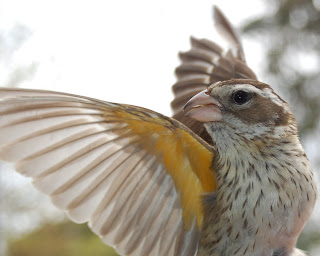I'm not glad because I don't think English classes are worth while, some of my best classes have been through the English department and I think I've learned a lot, but I was just about reaching the end of my tether so it was most definitely a good thing that I took a break.
My problem lies with the method of analysis employed by every English prof I've had so far. To me, some of the methods of discussing a text are a tad on the hypocritical side. Half of the time analysis is focused on the the secret subtext of the author, the “theme” and the deep, important message that's buried between the lines, as if every novelist and playwright writes simply as a means to embed their profound ideas in layers of meaningless text so that only the brilliant and enlightened English professor can read through and share a little, private laugh with themselves knowing that they “got it” when the lower beings, the unwashed masses, won't see the all important “point” of the piece.
The other half of the time it seems as if the work itself is treated as an output that the author couldn't help. As if their position in society, income, life experience, family and education leave only one possible option for production. In these cases the author is analyzed as well as the piece. Nothing is taken for granted, nothing is inconsequential and the author as well as everyone else is part of the group that “doesn't get it”.
I find both of these methods frustrating. I believe that authors – and I will focus mainly on novels though much of this applies to other topics of study in English classes as well – are aware of the message of their piece, if any, but that this isn't the be all and end all of what they write. I also, perhaps naively, tend towards believing what the author says to be true. In a world that a writer created we have to have faith that every word is a true account of what “happened”, because it is only those words that make it have happened. To question a fact claimed by an omniscient narrator or though a character that we are never led to believe would have reason to lie, is looking for depth where there isn't any.
Now I'm sure I'm biased as a lifelong, hobby writer, but I think that bias actually better gives me the right to speak up about it. I've written many short stories and just finished my first novel manuscript and while there are obvious themes and questions of morality raised, I would be embarrassed and frustrated if I ever heard anyone analyze my work the way I'm asked to in my courses.
It's not always a big deal, every word is not always so carefully chosen and the book is not always a hidden message of societal reform. It's too easy for two people with the same work to write essays with exactly opposite theses, each with piles evidence to back it up. Too often quotes can be analyzed in any number of ways and to me that says that there is no clear cut message.
It's all a sea of opinion and conjecture, and while this may be interesting and valuable I'm worried that over-exposure leads some people to believe that what they're saying is the one and only truth and they expect those around them to conform to that belief.
We see the dangers of this attitude with the constant battle over the interpretation of the bible. Different factions argue over the exact meaning and application of a certain passage in a modern context. Whether it is actually the word of God or not, it's still in the form of a book and this leads to disputes of opinion. We should all be aware and be careful of the limits of written language and I don't like the road that lit studies seems to be ambling down.
To me I believe that the last word on a piece should always be that of the author and no one else. They created the characters, the situation and chose every word, whether carefully or not. When class discussions get too far away from the actual words written on the page it feels like a disrespect to the author and to their work and most of the people we're studying are long dead and unable to stand up for themselves.
My thoughts are, possibly obviously, varied and scattered on the subject and, of course, since I am again taking English classes I do write essays of the type I am particularly against and this is what's been driving me crazy. I don't know where to draw the line, I don't know when it moves from worthwhile discussion to over-analysis and I don't know if I'll ever be able to define that point.
All I know is that too many times I'm cringing listening to a professor or other student expanding on an idea to the point that I think they're going beyond what was actually created by the author.
Pinter himself said "what I write is what I write" and time and time again claimed that his work had no deeper meaning, though his plays are extensively studied and considered absolutely filled to the gills with subtext. Really, I suppose, my question is: why do we keep looking for the “weasel under the cocktail cabinet”? Why can't we just let great literature be great literature, enjoy the feelings it excites, the smiles and tears it brings to us and whatever message we choose to take away from it? So tonight I'm going to re-read one of my favorite books and I'm going to open up and believe wholeheartedly in everything the author says and nothing more.







